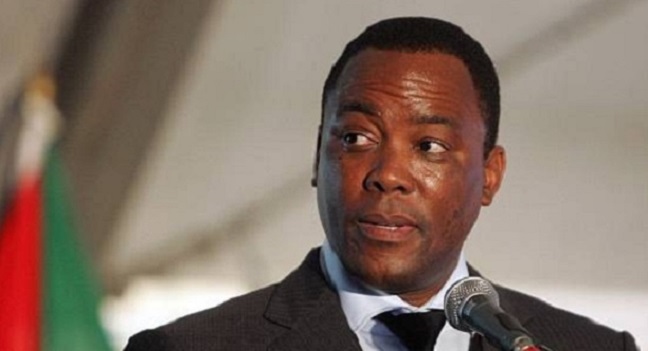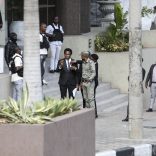Mozambique: Mondlane charged with "incitement to terrorism" - AIM report
AJUDEM likely to appeal to Constitutional Council Monday – AIM report

File photo
The Youth Association for the Development of Mozambique (AJUDEM) is expected to present its appeal on Monday against last week’s decision by the National Elections Commission (CNE) to exclude its list of candidates from the election of the Maputo municipal assembly.
The appeal goes, via the CNE, to the Constitutional Council, Mozambique’s highest body in matters of constitutional and electoral law.
Until a few weeks ago, AJUDEM was a little known coalition of civil society groups close to the ruling Frelimo Party. But it shot into the limelight when Samora Machel Junior (“Samito”), son of the country’s first President, and a member of the Frelimo Central Committee agreed to be its mayoral candidate.
Machel took this decision after the Maputo City Frelimo Committee did not even put him on the short list of three names for the position. His supporters believe that the inner-party election was not transparent, and that Machel enjoys massive support among the Maputo membership.
The CNE excluded the AJUDEM list because it supposedly did not contain enough supplementary candidates. (A list for any municipal assembly must contain enough names to fill all the seats in the assembly, plus at least three supplementary candidates).
AJUDEM denies this CNE claim. “The CNE decision is manifestly unjust and strange”, said the AJUDEM election agent, Zefanias Langa, cited in Monday’s issue of the independent newssheet “Mediafax”.
“We weren’t told exactly what happened”, said Langa. “The only information we received is that the list was excluded for lack of supplementary candidates. But we have supplementary candidates”.
The CNE says that four members of the AJUDEM list sent it letters requesting their names be withdrawn from the list.
AJUDEM claims they took this decision under pressure, including threats that they would lose their jobs if they remained on the AJUDEM list. Langa says none of the four ever sent AJUDEM a request to remove their names. The declarations of the four, requesting removal of their names, should not only have been recognised by a public notary, but should also have been acknowledged and stamped by AJUDEM. Langa claims that this never happened.
If the CNE took its decision on the basis of documents presented by the candidates who wanted to drop out, “then the CNE decided on the basis of false documents”, declared Langa.
AJUDEM now finds itself in financial difficulties, since one of its partner organisations, Unidos para Ajudar (United to Assist, UPA), has ended the partnership because AJUDEM is “involved in political activities”.
UPA describes itself as a body seeking to help vulnerable young people find jobs. It is an implementing agency of the International Youth Foundation (IYF). The UPA website has not been updated since 2014 and its Facebook page since 2016.
But it quickly ended its partnership with AJUDEM, through a statement, cited by “Mediafax”. claiming that AJUDEM’s involvement in “political activities” was incompatible with “the statutory principles of UPA and its partners”.
UPA is also demanding that AJUDEM return all the computers and other office equipment donated by UPA.
AJUDEM regards this as yet another form of political pressure. “It makes no sense because we have not transformed ourselves into a political organisation”, said Langa. “What we are doing is broadening our participation in the life of the country, and we think that inside the Municipal Assembly we can contribute better to the development of the city and particularly of its young people”.
“It’s just more pressure being put upon us because we have challenged important people”, he added.
Langa said AJUDEM had received information that other partners had received “orders” to end their partnerships, “but they have not accepted this because they understand that we are not banned from competing for the Maputo municipality”.
The main opposition party, Renamo, is also expected to appeal to the Constitutional Council on Monday against the CNE’s decision to disqualify its Maputo mayoral candidate, Venancio Mondlane.
Mondlane was excluded because he had resigned from the Maputo Municipal Assembly in 2014, when he was elected a deputy to the country’s parliament, the Assembly of the Republic (at the time, he was a member of a different party, the Mozambique Democratic Movement, MDM). The law says that people who resign from municipal bodies cannot be elected to municipal office in the subsequent elections.
But the electoral law also states that nobody can be a parliamentary deputy and a member of a municipal body at the same time. This incompatibility means that somebody in Mondlane’s position had no choice but to give up his seat in the municipal assembly.
Certain jurists, notably a former judge on the Constitutional Council, Teodato Hunguana, argue that, since losing his municipal assembly seat was an automatic consequence of election to parliament, Mondlane cannot truly be said to have resigned.
He argued that nobody should be punished just because they are elected to parliament – all that the law imposes in this case is that they cannot hold parliamentary and municipal office simultaneously.












Leave a Reply
Be the First to Comment!
You must be logged in to post a comment.
You must be logged in to post a comment.